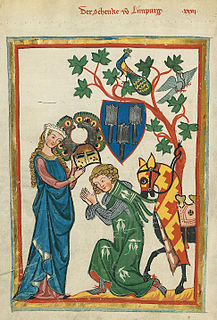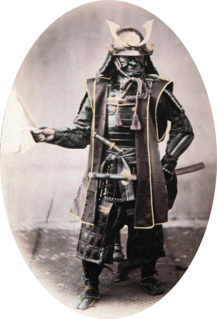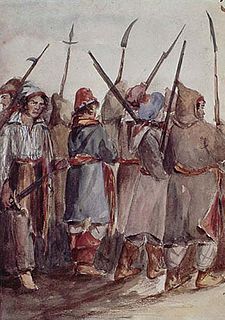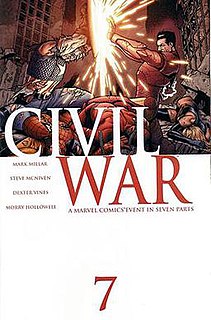
Chivalry, or the chivalric code, is an informal and varying code of conduct developed between 1170 and 1220. It was associated with the medieval Christian institution of knighthood; knights' and gentlemen's behaviours were governed by chivalrous social codes. The ideals of chivalry were popularized in medieval literature, particularly the literary cycles known as the Matter of France, relating to the legendary companions of Charlemagne and his men-at-arms, the paladins, and the Matter of Britain, informed by Geoffrey of Monmouth's Historia Regum Britanniae, written in the 1130s, which popularized the legend of King Arthur and his knights of the Round Table. All of these were taken as historically accurate until the beginnings of modern scholarship in the 19th century.

Bushidō is a moral code concerning samurai attitudes, behavior and lifestyle. It is loosely analogous to the European concept of chivalry. There are multiple Bushido types which evolved significantly through history. Contemporary forms of bushido are still used in the social and economic organization of Japan. Bushido is best used as an overarching term for all the codes, practices, philosophies and principles of samurai culture.

Historical reenactment is an educational or entertainment activity in which mainly amateur hobbyists and history enthusiasts put on uniforms and follow a plan to recreate aspects of a historical event or period. This may be as narrow as a specific moment from a battle, such as the reenactment of Pickett's Charge presented during the Great Reunion of 1913, or as broad as an entire period, such as Regency reenactment.
A slacker is someone who habitually avoids work or lacks work ethic.

Military science fiction is a subgenre of science fiction that features the use of science fiction technology, mainly weapons, for military purposes and usually principal characters who are members of a military organization involved in military activity, usually during a war; occurring sometimes in outer space or on a different planet or planets. It exists in literature, comics, film, and video games.
Militant means vigorously active, combative and/or aggressive, especially in support of a cause, as in "militant reformers". It comes from the 15th century Latin "militare" meaning "to serve as a soldier". The related modern concept of the militia as a defensive organization against invaders grew out of the Anglo-Saxon fyrd. In times of crisis, the militiaman left his civilian duties and became a soldier until the emergency was over, when he returned to his civilian occupation.

The Punisher is a fictional antihero appearing in American comic books published by Marvel Comics. The character was created by writer Gerry Conway and artists John Romita Sr. and Ross Andru. The Punisher made his first appearance in The Amazing Spider-Man #129.
Chickenhawk is a political term used in the United States to describe a person who is a war hawk yet actively avoids or avoided military service when of age. Generally, the implication is that chickenhawks lack the moral character to participate in war themselves, preferring to ask others to support, fight, and perhaps die in an armed conflict.

The Tale of the Heike is an epic account compiled prior to 1330 of the struggle between the Taira clan and Minamoto clan for control of Japan at the end of the 12th century in the Genpei War (1180–1185). Heike (平家) refers to the Taira (平), hei being the Sino-Japanese reading of the first Chinese character. Note that in the title of the Genpei War, "hei" is in this combination read as "pei" and the "gen" (源) is the first kanji used in the Minamoto clan's name.

A catch-22 is a paradoxical situation from which an individual cannot escape because of contradictory rules or limitations. The term was coined by Joseph Heller, who used it in his 1961 novel Catch-22. An example is:
"How can I get any experience until I get a job that gives me experience?" – Brantley Foster in The Secret of My Success.

Armor is a military science fiction novel by John Steakley. It features the military use of exoskeletons and insect-like alien enemies but concentrates on the psychological effects of violence on human beings.

Irregular military is any non-standard military component that is distinct from a country's national armed forces. Being defined by exclusion, there is significant variance in what comes under the term. It can refer to the type of military organization, or to the type of tactics used. An irregular military organization is one which is not part of the regular army organization. Without standard military unit organization, various more general names are often used; such organizations may be called a troop, group, unit, column, band, or force. Irregulars are soldiers or warriors that are members of these organizations, or are members of special military units that employ irregular military tactics. This also applies to irregular infantry and irregular cavalry units.

Slacktivism is the practice of supporting a political or social cause by means such as social media or online petitions, characterized as involving very little effort or commitment. The action may have little effect other than to make the person doing it feel satisfied that they have contributed. Underlying assumptions promoted by the term are that these low-cost efforts are ineffective, and substitute for more substantive actions rather than supplementing them. Empirical investigation has found these assumptions are incorrect. The belief that slacktivism is effective varies across different groups, and support for slacktivism is contingent upon what people consider as successful activism.

"Civil War" is a 2006–07 Marvel Comics crossover storyline consisting of a seven-issue limited series of the same name written by Mark Millar and penciled by Steve McNiven, and various other tie-in books published by Marvel at the time. The storyline builds upon the events that developed in previous Marvel storylines, particularly "Avengers Disassembled", "House of M", and "Decimation". The tagline for the series is, "Whose Side Are You On?"
Armchair revolutionary is a description, often pejorative, of a speaker or writer who professes radical aims without taking any action to realize them, as if pontificating "from the comfort of the armchair".
Comitatus was in ancient times the Latin term for an armed escort or retinue. The term is used especially in the context of Germanic warrior culture for a warband tied to a leader by an oath of fealty and describes the relations between a lord and his retainers, or thanes. The concept is generally considered by scholars to be more of a literary trope rather than one of historical accuracy.

Warriors of Kudlak is the fourth story of the British science fiction television series The Sarah Jane Adventures. It forms the fifth and sixth episodes of the show's first series. The first episode aired on the CBBC Channel on 15 October, and the second on 22 October 2007.

"Character of the Happy Warrior" is a poem by the English Romantic poet William Wordsworth. Composed in 1806, after the death of Lord Nelson, hero of the Napoleonic Wars, and first published in 1807, the poem purports to describe the ideal "man in arms" and has, through ages since, been the source of much metaphor in political and military life.
"Armchair general" is a derogatory term for a person who regards themselves as an expert on military matters, despite having little to no actual experience in the military. Alternatively, it can mean a military commander who does not participate in actual combat.
Social justice warrior (SJW) is a pejorative term used for an individual who promotes socially progressive and liberal views, including feminism, civil rights, gay and transgender rights, and multiculturalism. The accusation that somebody is an SJW carries implications that they are pursuing personal validation rather than any deep-seated conviction, and engaging in disingenuous arguments.












